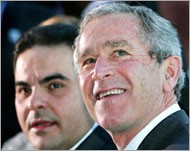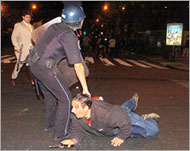Americas trade talks face deadlock
Talks between leaders from across the Americas on the creation of free trade block are facing deadlock as the two day summit meeting draws to a close.

The talks were taking place behind heavily fortified street barricades protected by armed security forces at a summit that has been marred by violent street protests.
As the summit was inaugurated on Friday, rioters smashed the glass storefronts of at least 30 businesses, set fire to a bank and battled police with slingshots and rocks.
Police fought back with tear gas and made 64 arrests. No major injuries were reported.
Free trade bloc
The United States is hoping to use the America’s Summit to build support for reviving the Free Trade Area of the Americas, or FTAA, which would eliminate trade barriers from Canada to Chile. It has stalled amid opposition from Venezuela, Brazil and others.
On Saturday, Brazilian President Luiz Inacio Lula da Silva said FTAA discussions should wait until after crucial World Trade Organization (WTO) talks in December on stripping global trade barriers and boosting the world’s economy.
 |
|
The US seeks to revive talks on
|
Speaking to reporters on the sidelines of the summit, Silva said talks now on the free trade bloc would divert negotiators away from concentrating on the WTO negotiations – the same argument that has kept FTAA stalled for months.
The violent demonstrators failed to break through the first of several police blockades protecting Bush and the other world leaders, and the summit’s inauguration ceremony took place without a hitch on Friday.
“What I’m most upset about is that I’ll bet you Bush wasn’t even told about” the riot, said Mar Del Plata Mayor Daniel Katz.
Summit declaration
On Saturday, summit negotiators are expected to draw up a summit declaration that could call for relaunching talks on
the proposed FTAA – an ambitious proposal originally raised in 1994 at the first Americas summit in Miami.
Mexican President Vicente Fox said the FTAA proposal would
move forward in any event because 29 of the 34 nations
taking part in the summit were considering cobbling together their own FTAA – minus opponents like Venezuela, Brazil, Argentina, Paraguay and Uruguay.
 |
|
Protesters opposed to the talks |
The bloc would rival the European Union as the world’s largest, but its creation has been stalled for years amid bickering over US farm subsidies and other obstacles.
Venezuelan President Hugo Chavez emerged as the most strident opponent of the free trade bloc, addressing more than 20,000 protesters hours before the summit’s inauguration.
“Only united can we defeat imperialism and bring our people a better life,” he said, adding: “Here, in Mar del Plata, FTAA will be buried!”
Opposition
Chavez wants an anti-FTAA deal based on socialist ideals, and he has used his country’s oil wealth to build support, offering fuel with preferential financing to various Caribbean and Latin American countries.
Washington seems little concerned about Venezuela’s vocal opposition.
“It’s become clear as the negotiations have moved forward that there is significant support within the region for economic integration and for a Free Trade Area of the Americas,” said Thomas Shannon, the new assistant secretary of state for Western Hemisphere affairs.
Outside Mar del Plata, other anti-Bush protests also turned violent. Four police officers were injured in Rosario in clashes that followed an attack on a branch of a US-based Citibank. And in the capital city of Buenos Aires, activists tossed Molotov cocktails at a US-based bank and two fast food restaurants, including a McDonald’s.
In neighbouring Uruguay, hooded protesters chanting anti-Bush slogans attacked a series of bank buildings, shops and shattered windows in an outburst swiftly quelled by riot police. Leftist groups were blamed.
Most Argentines seemed to reject the violence. “I don’t like Bush, but this is too much,” said Ramon Madrid, a hotel manager in Mar del Plata who hurriedly closed up after rioters smashed the windows of a bakery three doors down. “There is no need for violence.”